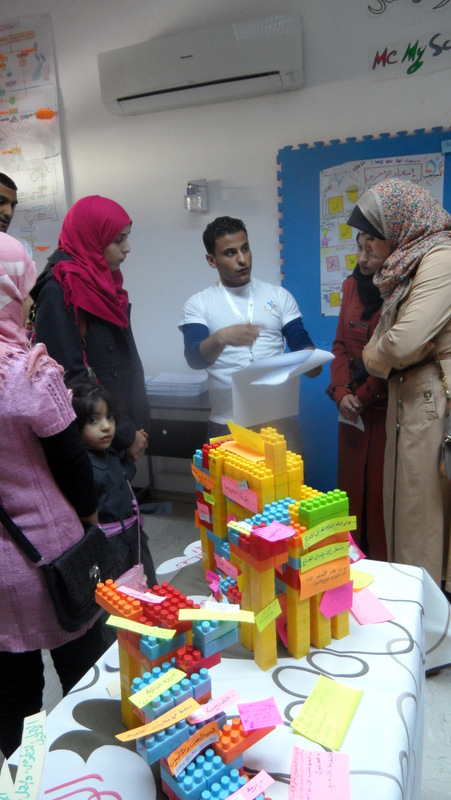By Valerie Stocker.

Tripoli, 29 January 2013:
An open day at Libya Youth Centre
Children eagerly showed off their artworks and newly-acquired skills to . . .[restrict]parents and visitors on Saturday when the Libya Youth Centre – Markaz Libya Lil Shabab – opened its doors to the public.
The open day for the centre, a non-profit initiative launched by NGO Hilfswerk Austria and sponsored by Austrian oil company OMV, attracted parents and many other visitors. The centre, which helps traumatised 6 to 25 year-olds to regain their confidence, through educational and leisure activities as well as psychological counselling, has so far helped 428 young Libyans.
“There is no other place where children can take part in supervised fun and useful activities and I don’t have to worry about their safety”, explains one mother. “On the streets, our children are exposed to all sorts of problems, including violence, crude language and bad behaviour.”
Ahmad, her 13-year-old son, has been attending the youth centre for the past few months. Libya does not have much to offer in the way of organised after-school activities. In the past, children could join the scouts or regime-linked youth-clubs such as the rawabit shababiyya, but activities there were deeply politicised and mostly designed to inculcate jamahiriyyan ideology. The only alternative, according to Ahmed’s mother, was football, which partly explains its popularity among young Libyans.
Unfortunately, her son has finished his programme now, and must make way for new young people. In spite of OMV’s generous funding – €2 million euros over two years – the NGO does not have the capacity for unlimited children. Only the social and psychological counselling continues once the youngster has completed a course.
The work of the centre, recently extended to April 2014, has lasting effects. Much of the work shown at the open day points to changes of attitudes and improved well-being in the children. Through drawings, photos, videos and writing, the children illustrate their attempts to overcome fears, worries, shyness and anger.
In the workshops, participants are encouraged to express their thoughts and emotions, discuss problems they have encountered and share their views with others to find solutions collectively. While the younger children are offered creative and sports activities, those who are in their late teens mostly take part in group discussions on ambitions and goals in life and issues that concern society as a whole.
“This has been a very positive experience,” says activity manager Lamya. “It took some time to get through to some of the teenagers, as they are distrustful of the system and often lack motivation, but once they got started I was surprised at their eagerness to engage in debates on topics such as women’s rights or their role as citizens in an open-minded manner, regardless of differences of opinion.”
Lamya emphasises that the social workers do not impose opinions but instead provide a platform for the young participants to address issues that matter to them. “The centre does not tell us what to do,” she said, “it simply reminds us that we CAN do.”
What is clear from the exhibits is the children’s unhappy past experiences and their expectations for the future. With the focus on transition and political challenges, children’s needs can be forgotten.
A storybook about one day in a Libyan boy’s life, written and illustrated by some of the children, provides a glimpse of the challenges they may face on a daily basis. The child protagonist learns that a friend died in a car accident then, on his way back from school, he walks into a street-fight between militias. His mother urges him to come home quickly to know he is safe.
Homes are not always safe places, however. One of the main concerns in present-day Libya is the proliferation of small weapons that people often keep in their houses within easy reach of children. Last month, the centre held an awareness-raising campaign during which parents were called on to reflect on self-protection. They were asked to put themselves in the place of their children, for whom seeing their elders carry guns has become something entirely normal.
Even if children suffered no apparent physical or psychological harm from the months of fighting in 2011 and the ensuing instability, they could still suffer from post-traumatic stress disorder (PTSD). While some of the younger children suffer from anxiety, have problems at school and are distrustful of the world around them, many older teenagers present signs of depression and feel disillusioned with their lives and futures, explains Diana, the psychologist at Libya Youth Centre.
Some children have issues stemming from difficult family relationships, as well as the overall uncertainty and lack of opportunities for young Libyans. While trying to relieve pain and fear, the social workers also try to instil some sense of responsibility with regards to society. “You do not deserve your country, unless you take care of it,” reads one of the posters on the wall.
The centre offers both educational activities and psychological support in a country where there is little understanding of, or professional assistance for, psychological illnesses. The only specialised clinic for psychiatry and neurology in Tripoli lacks capacity and no longer has an inpatient ward. Even for children with disabilities there are hardly any designated institutions.
Another mother at the open day is a former care worker for deaf and mute children. She explained the difficulties for children who cannot attend normal schools. The few existing special childcare facilities are often too expensive for parents to afford. “When we had nowhere else to go with our disabled child, we took her to Waatesemu, the charity held by Aisha Qaddafi’s daughter since it was supposedly providing help for such cases,” she said, “but they rejected our query, with no explanation.” Under the former regime, she added, even those in desperate need of help had to rely on their wasta (personal connections) to obtain any government assistance.
Awareness of mental health issues seems to be improving. The centre has just recruited two additional local volunteers for the social and psychological services it provides. They will assist the psychologist and get on-the-job training at the same time. Gradually, responsibilities will be handed over to the Libyan staff for them to carry on the work and ensure the sustainability of the programme.
It will probably take years to see any significant improvement, but the centre is a first step that has already given a lot to those enrolled. “This has given us hope,” says Ahmad’s mother, “maybe it will encourage the creation of more such places in the future. [/restrict]




